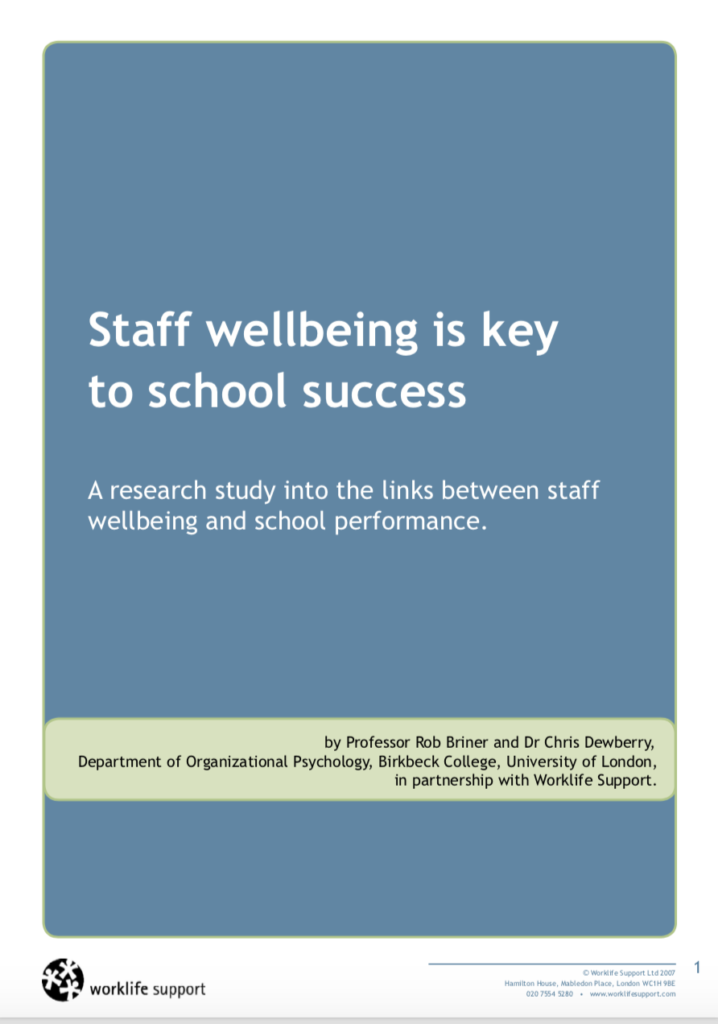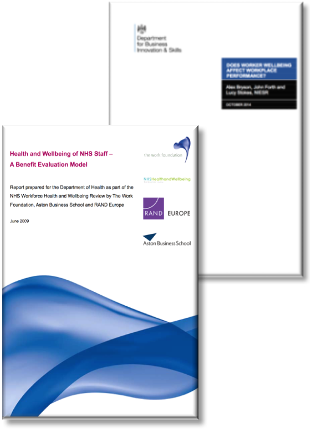There is strong evidence for improving staff wellbeing, however, the main focus is often on pupils and students to ensure academic outcomes are as good as they can be and focusing on their wider character development and wellbeing.
This is the purpose of schools and rightly very important, yet evidence shows that making staff wellbeing your priority has significant performance benefits.
However, look after your staff and they will look after your students, and that gives you the best chance of satisfying your other stakeholders.
So, let’s take a look at:
- The evidence
- The role and impact of line managers
The evidence
The evidence for making wellbeing a part of everyday behaviours and activities is compelling.
There has been limited research into school staff wellbeing and its impact on outcomes. The only major report, written in 2007 by Birkbeck College, University of London, in partnership with Worklife Support, highlighted the following:

- Staff wellbeing had a statistically significant impact on the SATs results of English primary schools.
- Teacher enjoyment was linked with a higher value added measure of primary pupil performance.
- Increases in staff wellbeing was linked to an increased performance in 5+ GCSEs A to C.
- Higher staff wellbeing also led to improved value added progress through key stages 2 to 4.
While staff wellbeing wasn’t the single factor to increase results, the evidence for improving staff wellbeing was seen as being significant and the researchers were excited because they saw this as being more easily influenced than many other actions schools were taking that increased student outcomes.
While education research is limited, the role self-reported staff wellbeing plays in improving results is supported through other research, in business and more significantly in the health service.
In business, a 2014 report for the Department of Business Innovation and Skills, titled ‘Does Worker Wellbeing Affect Workplace Performance’, found that staff wellbeing shows a strong and positive link with improved workplace performance for both profitability (financial); and labour productivity and the quality of outputs and services.
It also showed a strong link between wellbeing and job satisfaction, including aspects such as training, skills development opportunities, how much autonomy staff have in their role, and how much scope they have to use their own initiative and influence decisions.
Dame Carol Black’s review of the health of Britain’s working-age population, in her 2008 report, ‘Working for a healthier tomorrow’ found considerable evidence that health and wellbeing programmes produced economic benefits across all sectors and all sizes of business: in other words, that good health is good business. She also concluded that the benefits of wellbeing go beyond the quality of life of staff and extend to increasing an organisation’s productivity and profitability.
Much greater research has been carried out within the health sector, where staff wellbeing is consistently shown in research to be linked with patient care, welfare and mortality.
Among the highlights from findings are:

- Evidence of a causal link between staff wellbeing and performance outcomes.
- There is a relationship between staff wellbeing and staff reported patient care, patient reported patient care and hospital mortality rates.
- Staff wellbeing is a driver of patient care performance and seeking to systematically enhance staff wellbeing is not only important in its own right but also for the quality of patient experiences.
- Local climate is important, even for high performing staff in demanding jobs.
- It is important to monitor employee wellbeing and target resources to areas known to be problematic.
- Management practices are significantly linked to NHS staff health and wellbeing
- Staff wellbeing is linked to multiple outcomes, including staff absenteeism, turnover, agency spend (e.g. supply staff), patient satisfaction, infection rates and mortality rates.
- The associated financial costs of these can be significant.
If you are faced with a stay in an NHS hospital, it is well worth checking out how staff report their wellbeing! Put simply, the better that staff report their own wellbeing, the greater the chance of survival. Lower wellbeing leads to more deaths. While not quite as stark in education, we can transfer many of these findings and apply them to the school setting.
This adds even further to the evidence for improving staff wellbeing and delivering better outcomes.
The Role and Impact of Line Managers

There is also considerable evidence that the number one cause of poor staff wellbeing and performance are the behaviours and social skills of line managers. This is the view of Professor Sir Cary Cooper, a leading UK expert on organisational wellbeing, though I am sure, like me, you have also experienced it.
Of course, it’s not all their fault, as many are a ‘doer’ one day, and then thrust into leadership the next, often with little training and development. Middle leaders are also often expected to continue with 90+% of their previous or current job and are given precious little time to be ‘leaders’.
However, with the right awareness, they can take responsibility, and create an environment where others thrive.
The good news is there has been extensive research by Goldsmiths, University of London, into which leadership competencies improve staff wellbeing and reduce stress.
You can see more about these competencies and behaviours here.
If you have any questions on staff wellbeing, please get in touch.
